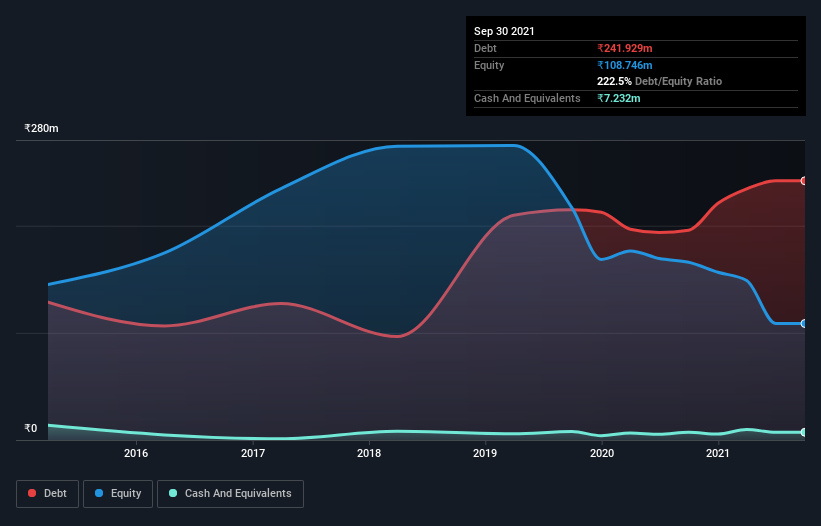Vadivarhe Speciality Chemicals (NSE:VSCL) Is Carrying A Fair Bit Of Debt

Some say volatility, rather than debt, is the best way to think about risk as an investor, but Warren Buffett famously said that 'Volatility is far from synonymous with risk.' So it might be obvious that you need to consider debt, when you think about how risky any given stock is, because too much debt can sink a company. Importantly, Vadivarhe Speciality Chemicals Limited (NSE:VSCL) does carry debt. But should shareholders be worried about its use of debt?
What Risk Does Debt Bring?
Generally speaking, debt only becomes a real problem when a company can't easily pay it off, either by raising capital or with its own cash flow. In the worst case scenario, a company can go bankrupt if it cannot pay its creditors. However, a more common (but still painful) scenario is that it has to raise new equity capital at a low price, thus permanently diluting shareholders. Of course, debt can be an important tool in businesses, particularly capital heavy businesses. The first step when considering a company's debt levels is to consider its cash and debt together.
Check out our latest analysis for Vadivarhe Speciality Chemicals
What Is Vadivarhe Speciality Chemicals's Debt?
As you can see below, at the end of September 2021, Vadivarhe Speciality Chemicals had ₹241.9m of debt, up from ₹195.8m a year ago. Click the image for more detail. However, it also had ₹7.23m in cash, and so its net debt is ₹234.7m.

How Healthy Is Vadivarhe Speciality Chemicals' Balance Sheet?
According to the last reported balance sheet, Vadivarhe Speciality Chemicals had liabilities of ₹217.4m due within 12 months, and liabilities of ₹148.6m due beyond 12 months. On the other hand, it had cash of ₹7.23m and ₹110.0m worth of receivables due within a year. So it has liabilities totalling ₹248.8m more than its cash and near-term receivables, combined.
This deficit is considerable relative to its market capitalization of ₹375.8m, so it does suggest shareholders should keep an eye on Vadivarhe Speciality Chemicals' use of debt. This suggests shareholders would be heavily diluted if the company needed to shore up its balance sheet in a hurry. When analysing debt levels, the balance sheet is the obvious place to start. But it is Vadivarhe Speciality Chemicals's earnings that will influence how the balance sheet holds up in the future. So when considering debt, it's definitely worth looking at the earnings trend. Click here for an interactive snapshot.
Over 12 months, Vadivarhe Speciality Chemicals made a loss at the EBIT level, and saw its revenue drop to ₹226m, which is a fall of 13%. We would much prefer see growth.
Caveat Emptor
While Vadivarhe Speciality Chemicals's falling revenue is about as heartwarming as a wet blanket, arguably its earnings before interest and tax (EBIT) loss is even less appealing. Indeed, it lost a very considerable ₹45m at the EBIT level. When we look at that and recall the liabilities on its balance sheet, relative to cash, it seems unwise to us for the company to have any debt. So we think its balance sheet is a little strained, though not beyond repair. However, it doesn't help that it burned through ₹16m of cash over the last year. So suffice it to say we do consider the stock to be risky. The balance sheet is clearly the area to focus on when you are analysing debt. But ultimately, every company can contain risks that exist outside of the balance sheet. Be aware that Vadivarhe Speciality Chemicals is showing 4 warning signs in our investment analysis , and 3 of those don't sit too well with us...
At the end of the day, it's often better to focus on companies that are free from net debt. You can access our special list of such companies (all with a track record of profit growth). It's free.
If you're looking to trade Vadivarhe Speciality Chemicals, open an account with the lowest-cost platform trusted by professionals, Interactive Brokers.
With clients in over 200 countries and territories, and access to 160 markets, IBKR lets you trade stocks, options, futures, forex, bonds and funds from a single integrated account.
Enjoy no hidden fees, no account minimums, and FX conversion rates as low as 0.03%, far better than what most brokers offer.
Sponsored ContentNew: Manage All Your Stock Portfolios in One Place
We've created the ultimate portfolio companion for stock investors, and it's free.
• Connect an unlimited number of Portfolios and see your total in one currency
• Be alerted to new Warning Signs or Risks via email or mobile
• Track the Fair Value of your stocks
Have feedback on this article? Concerned about the content? Get in touch with us directly. Alternatively, email editorial-team (at) simplywallst.com.
This article by Simply Wall St is general in nature. We provide commentary based on historical data and analyst forecasts only using an unbiased methodology and our articles are not intended to be financial advice. It does not constitute a recommendation to buy or sell any stock, and does not take account of your objectives, or your financial situation. We aim to bring you long-term focused analysis driven by fundamental data. Note that our analysis may not factor in the latest price-sensitive company announcements or qualitative material. Simply Wall St has no position in any stocks mentioned.
About NSEI:VSCL
Vadivarhe Speciality Chemicals
Manufactures and sells organic chemicals, intermediates, active pharmaceutical ingredients (APIs), personal care products, and specialty chemicals in India and internationally.
Acceptable track record low.
Market Insights
Community Narratives



